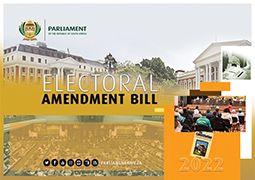
The current patriarchal society, where men have more access to resources than women, could lead to overrepresentation of men in the National Assembly. This was one of the views of the public during the first day of nationwide public hearings on the Electoral Amendment Bill in Richards Bay, at the Ngwelezane Community Hall.
The Electoral Amendment Bill was necessitated by the June 2020 Constitutional Court judgement on the New Nation Movement NPC and Others vs President of the Republic of South Africa and Others case. The judgement found that the Electoral Act 73 of 1998 was unconstitutional, to the extent that it requires adult citizens to be elected to the National Assembly and to provincial legislatures only through their membership of political parties.
While many participants highlighted their support for the Bill, they underscored various areas needing amendment to ensure that the spirit of representation intended by the Bill is achieved. One area of concern was that election deposit, as currently required of independent candidates in the Bill. will disadvantage female candidates.
“I am not a feminist, but I do know that South Africa is a patriarchal society and in most cases men have more money than women. Proportional representation talks about parties ensuring that there is fair allocation for both men and women. I am imagining a situation where, because men have more money than women, we have a Parliament that is full of men,” said one member of the public Ms Nonto Simelane. As a remedy, Ms Simelane called for a mechanism to regulate representation to ensure that there is fair representation.
There was also a call for Parliament to get legal opinion to ensure that equal representation is ensured using the formula as it is envisioned in the Bill. The argument presented was that the current Bill might lead to a situation in which KwaZulu-Natal and Gauteng occupy 50% of the regional seats, based on population and number of votes received. This would undermine the intention of equitable representation, as espoused by the Bill. By getting a legal opinion, the committee will be avoiding length legal disputes that will have an impact on the electoral process.
Participants also questioned how the Bill deals with political funding for independent candidates. “How will government intend to fund independent candidates, because mainstream political parties within South Africa have parliamentary and other legislative funding. So if one entered into an election as an independent, what mechanism is there to fund independent candidates? Do we put them on the same financial footing as we would to another political party? Perhaps that is something that should be looked into from both a financial and fairness point of view,” said Councillor Hienstable.
There was also a call for a voter education programme once the Bill is adopted, to ensure that voters understand its technical aspects.
The leader of the delegation, Mr Brandon Pillay, welcomed the insightful public hearings and assured participants that their views will be taken into consideration when the committee deliberates on the Bill. “We thank everyone who participated in these hearings and made insightful contributions. Your contributions will serve to strengthen this Bill and ensure that it is encapsulates the spirit of representation, as demanded by the Constitutional Court,” Mr Pillay concluded.
Malatswa Molepo
8 March 2022

